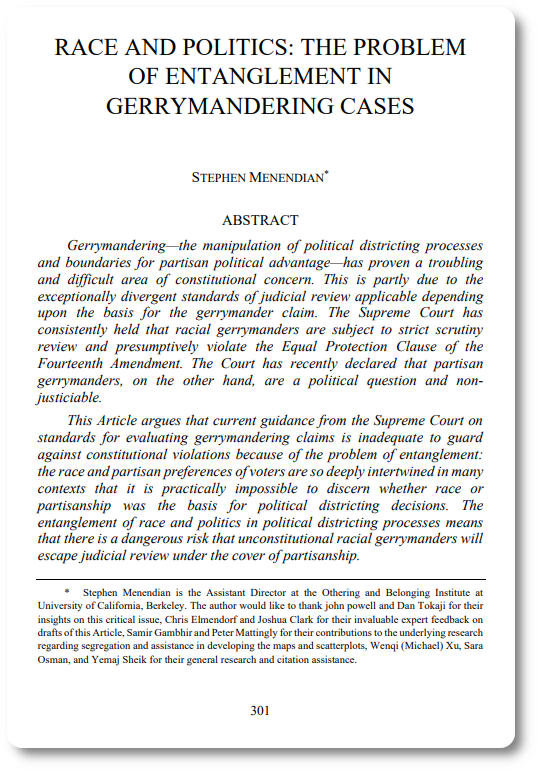Assistant Director Stephen Menendian investigates the problem of "entanglement" in gerrymandering cases, where race and political identification are so bound-up that it is difficult in many cases to differentiate between motives when evaluating gerrymandering claims. Stephen reviews the history of gerrymandering and presents new data on the role of segregation in undergirding gerrymandering abuses.
Citation: 96 S. Cal. L. Rev. 301
Article Abstract from the Southern California Law Review:
Gerrymandering—the manipulation of political districting processes and boundaries for partisan political advantage—has proven a troubling and difficult area of constitutional concern. This is partly due to the exceptionally divergent standards of judicial review applicable depending upon the basis for the gerrymander claim. The Supreme Court has consistently held that racial gerrymanders are subject to strict scrutiny review and presumptively violate the Equal Protection Clause of the Fourteenth Amendment. The Court has recently declared that partisan gerrymanders, on the other hand, are a political question and non-justiciable.
This Article argues that current guidance from the Supreme Court on standards for evaluating gerrymandering claims is inadequate to guard against constitutional violations because of the problem of entanglement: the race and partisan preferences of voters are so deeply intertwined in many contexts that it is practically impossible to discern whether race or partisanship was the basis for political districting decisions. The entanglement of race and politics in political districting processes means that there is a dangerous risk that unconstitutional racial gerrymanders will escape judicial review under the cover of partisanship.
This Article explicates the problem of entanglement in gerrymandering cases and evaluates several possible solutions. Presenting original research drawn from the 2020 decennial census and voter data from the 2020 presidential election, this Article establishes an empirical basis for the problem of entanglement. Although prior legal scholarship has emphasized the problem of “conjoined polarization”—the overlap in partisan and racial preferences—as an enabling factor in partisan redistricting processes, this Article claims that racial residential segregation plays a more central and dynamic role than has generally been acknowledged in undergirding the entanglement of race and politics in political redistricting processes.





